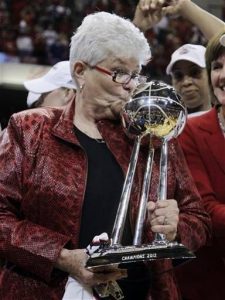The NBA Finals date back to 1947 (when they were known as the Basketball Association of America Finals) and the very 1st NCAA tourney was held in 1939. Olympic basketball competition is even older: it debuted as a demonstration event in 1904 and the men’s version became a medal sport in 1936, with the women finally getting their chance to go for the gold in 1976. The United States has dominated Olympic basketball competition from the start: the men have won 15 gold medals in the 18 tournaments they have participated in during the past 84 years, while the women have won 8 gold medals in the 10 tournaments in which they have competed during the past 44 years. Those of you who were looking forward to the 2020 Olympics opening ceremonies in Tokyo on July 24, 2020 will have to wait an extra 364 days, as the coronavirus caused a postponement until July 23, 2021. Due to the absence of college basketball since mid-March, HoopsHD’s Jon Teitel decided to fill the void by trying to interview as many prior Olympic players/coaches as possible so that you have something to read this summer while not watching the Summer Games. We continue our coverage by chatting with Coach Lin Dunn about winning a WNBA title in 2012 and winning a gold medal in 1992.
You began your coaching career at Austin Peay in 1970 as the physical education instructor, supervisor of the cheerleading team, and volunteer coach of the unfunded women’s volleyball/basketball/tennis teams: how difficult was it to have all of that on your plate 50 years ago, and what has been the biggest change in women’s college athletics over the past half-century? It was extremely exhausting: teaching 8 different PE classes alone was time consuming! There have been so many big changes: better resources/better access to facilities/better qualified staffs.
In your 1 season at Mississippi in 1978 you beat 3-time national champion Delta State in Cleveland: how were you able to break their 56-game winning streak? I actually coached 2 years at Ole Miss: during year #1 I was the volleyball/tennis coach and in year #2 I was the basketball coach. We beat Delta State due to having a very talented team: Peggie Gillom/Cathy Casteel/Glenda Springfield were as good as any players in America.
In the 1994 NCAA tourney as coach at Purdue you made it to the Final 4 before losing to North Carolina: how did the game change in the 2nd half after the Tar Heels switched to a zone defense after made baskets? North Carolina was taller/quicker/more athletic than we were. We could not contain world class sprinter Marion Jones!
You were an assistant for team USA at the 1992 Olympics and spent 8 years on the USA Basketball Selection Committee: what did it mean to you to win a bronze medal, and how did the Committee decide which players to select? We won a bronze medal in the 1992 Olympics, a gold medal in the 1990 world championships, and a gold medal in the 1986 Pan Am Games. The committee always tried to select the 12 best players with a blend of experienced players as well as 2-3 players to develop for the future. The key was the ability to embrace whatever role you were given.
In the 2009 WNBA Finals as coach of Indiana you lost the decisive Game 5 to Phoenix: where does Finals MVP Diana Taurasi rank among the greatest players that you have ever seen? We should have won Game 4 at home as well as Game 5 in my opinion! This was our 1st trip to the Finals and I think that our lack of experience hurt us. Diana is an excellent offensive player…but I cannot rank her as the best all-around player ever because she never worked on the defensive end as hard as she did on offense. I believe that the “best’ player must excel at the highest level in all aspects: offense/defense/rebounding.
In the 2012 WNBA Finals you beat defending champion Minnesota to win the title: what did it mean to you to win a title, and what was the feeling like in your locker room afterward? It was very rewarding for Tamika Catchings: she had worked so long and so hard and deserved a ring! We were the underdog and did not have the home-court advantage so our championship was a testament to overcoming adversity.
You spent more than 25 years as a college head coach and more than 10 years as a pro head coach: what is the biggest difference between being a college coach vs. a pro coach? The pro players are bigger/faster/stronger/smarter so there is no comparison.
You were inducted into the Women’s Basketball Hall of Fame in 2014: where does that rank among the highlights of your career? Hall of Fame events are nice but what is more important to me are the players I coached and how I may have positively impacted their lives. I am very proud of my former players who became coaches themselves.
You founded the consulting firm Coaches for Coaches to help train head coaches: what is the key to leading a successful athletic program? There is no 1 key: however, a positive/winning culture is crucial.
You currently work as a special assistant at Kentucky: how do you like the job, and what do you hope to do in the future? I work with great people who really care about their student-athletes. I enjoy giving back to the game that has been so good to me by helping head coaches/assistant coaches get better.

